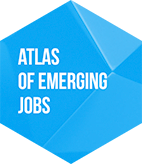Jobs of the future: what will they be like?

14.08.2015
Of course, nobody can predict the future fully and accurately. History is full of examples of unsuccessful forecasts and predictions: early in the 20th century, flying enthusiasts promised an airplane for every family; in the mid-20th century, we expected cars powered by nuclear reactors to fill the streets and coffee pots to use nuclear batteries. In the 1970s, many people shared the idea that man would have inhabited Mars and Jupiter’s satellites by the beginning of the 21st century. Those unfulfilled predictions aside, there have been many accurate forecasts, e.g. the current technological progress in Japan and South Korea is mainly based on scientific forecasting, while the founders of the famous Silicon Valley not only anticipated the era of personal computers and the Internet, but managed to capitalize on their emergence. Successful predictions are based on understanding exactly what powerful social and technological processes or trends are currently changing the world around us and shaping our future.
So, what trends determine the future of work? What changes are likely to happen?
GLOBALIZATION
Firstly, the global economy (and Russia as part of the world) will inevitably move toward closer integration and deeper regional specialization. It means that even now we cannot say for sure where this or that complex device has been produced. While a car or computer may be produced in Japan, its components are supplied from around 30 countries, while 40 other countries provide raw materials. At the same time, even a creative product, such as a cartoon, may be written in the U.S., drawn in Russia, and 3D-animated in China. This is why future employees will have to be able to work in multilingual and multicultural environments, communicating with partners from all over the world. Those partners and employees will be partly located in other countries, which means that the standard will be not just remote employment (where an employee works at home, communicating with colleagues over the Internet), but also work in distributed teams (where specialists working together may be on different continents). Apart from speaking a foreign language, one will need the ability to communicate in international professional languages, i.e. to know industry requirements, standards and processes applied. Moreover, a significant number of employees will have to be familiar not only with their respective industries but with the industries of their suppliers and customers, i.e. to speak the language of inter-sector communication, which allows people from the remotest industries to work together (e.g. a psychologist, musician and programmer, co-creating a new sound spa technology for relaxation).
INCREASING COMPETITION IN THE ECONOMY
Secondly, global economic development is leading to increasingly tougher competition between providers of products and services. The most successful are companies able to create new products and services, and quickly adapt to consumer demand. Competition between them is accompanied by constant changes in the game rules in the market, as new products emerge to replace existing ones or even to wipe out entire markets (just like automobiles replaced horse-driven carriages and mobile phones replaced pagers).
ENHANCING CLIENT FOCUS
Strong competition demands an increasingly deeper insight of what the customer actually needs, thereby teaching employees client focus.
TRANSITION FROM JOB FUNCTIONS TO PROJECT MISSIONS
On the other hand, constant changes in the economy are reducing the number of jobs where one can perform the same duties their entire life (such as an accountant or salesperson), while more and more jobs are appearing in which work is organized as a set of various projects. This is why a crucial skill for most future employees to master will be the ability to work in project teams as well as to engage in project management. Finally, in an age of change, many employees should be prepared to work under high uncertainty, which requires quick decision-making, reacting to changing work conditions, allocating and re-allocating resources, and time-management under conditions of a constantly changing workflow.
AUTOMATION
One of the most significant changes taking place is the ever-present advancement of automation technologies. It is a well-known fact that the automation of manual and even intellectual labour began quite a while ago. The first machines to replace humans in labour-intensive manual operations were built as early as the XVIII century, and computers began to replace calculating engineers in the mid-XX century. However, the process has intensified considerably over the past decade, primarily because mass-produced computers have become powerful enough to perform operations, which previously only man could perform (e. g. identifying a criminal in a crowd, recognizing a tumor on a tomogram, or even writing news articles). Another reason is that industrial and household robots are becoming noticeably cheaper. Automation is a requirement of the above-mentioned global competition and takes place when a robot or program is more productive or efficient than a human performing the same task. According to an estimate by Oxford scientists from Martin School’s Programme on the Impacts of Future Technology, up to 45% of existing jobs in developed countries will be replaced by robots and computer software within the next 20 years. This does not mean that people will become jobless, however; they will have to find jobs that robots cannot perform. Most of these jobs will be creative. As a result, artistic talents, which have always been a prerogative of solitary creators, will become a mass phenomenon. In addition, more jobs will involve teamwork, with people working less with various mechanisms and more with other people. In these conditions, the ability to organize joint work with other individuals and groups will become an important (and widely common) skill.
INTENSIVE USE OF PROGRAMMABLE DEVICES
In a world abundant with automatic devices, computers and robots should be our assistants rather than our competitors. Skills will be needed to set up robots and AI systems to perform man-defined tasks. Computer skills, as we understand them today, include using a browser, sending an email, or typing a text in a word processor. These skills will be essential, but far from adequate. In a future world, almost every employee is assumed to have mastered at least basic programming skills (indeed, even now, programming is becoming part of standard training for workers in developed industrial countries, as most of them operate programmable CNC machines).
GROWING COMPLEXITY OF MANAGEMENT SYSTEMS
The professional world of the future is evermore sophisticated, filled with flexible technological solutions and enforcing permanent preparedness for change. It will require an increasingly greater number of people able to find their way within it, as well as to efficiently manage projects, teams, or entire organizations. To tackle this problem, more and more employees will need to master systems thinking, an ability to quickly understand the intricacies of complicated processes, organizations or mechanisms. Systems thinking is what helps people quickly come to grips with a problem and develop with a solution, quickly catch up in an unfamiliar business area, and bring their ideas home to people from other industries and branches. Systems thinking is thus one of the key cross-professional skills that will be needed by a great number of technical specialists and managers in all industries.
STRICTER ENVIRONMENTAL REQUIREMENTS
Another very important trend, which has become quite common in the world and the importance of which is being gradually recognized in Russia, is the increase in requirements for the environmental safety of products and services. Environmental safety means not only using clean water and farmed products; to a much greater extent, it means having a frugal attitude to all types of natural resources (e.g. reducing energy, water or raw material consumption) and waste reduction (including recycling, biodegradable materials, etc.). We all realize that natural resources are limited and we are all responsible for the places we inhabit, be it our home, our city, country, or even our shared planet. This is why environmentally conscious behaviour should be made part of standard training for any job, or should even be taught in elementary schools, in order to eventually become a standard for any adult, much like reading and writing skills.
The trends discussed above describe changes to occur concurrently in multiple manufacturing and servicing branches of the economy. These trends require new, cross-professional skills that are key for specialists in any industry. Mastering these skills will enable employees to improve their job performance in their respective industries and to switch industries, all while staying in demand.
- Multilingual and multicultural abilities (fluent English and knowledge of a second foreign language, understanding of the national and cultural context of partner countries, and understanding of job specifics in foreign industries).
Cross-industry communication skills (understanding of technologies, processes, and market conditions in different related and unrelated sectors).
- Client focus, ability to address customer requests.
- Ability to manage projects and processes.
- Ability to work under high uncertainty and quickly changing conditions (quick decision-making, prompt reaction to changing work conditions, ability to allocate resources and manage personal time spending).
- Creative abilities, developed aesthetic taste.
- Programming IT solutions / Managing complex automated systems / Dealing with artificial intelligence.
- Ability to work with teams, groups and individuals.
- Systems thinking (ability to define and work with complex systems, including system engineering).
- Lean manufacturing, production process management based on permanent focus on removing all types of waste, which implies involving every employee in the business optimization process along with maximum client focus.
- Environmentally conscious thinking.
